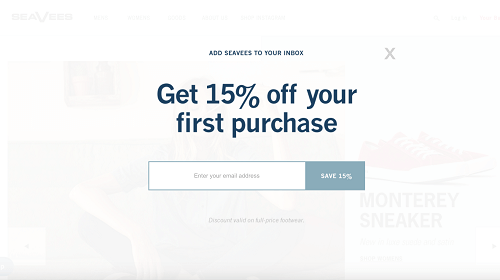In the digital marketing world, the term “big data” is thrown around a lot. By definition, big data is extremely large data sets that may be analyzed computationally to reveal patterns, trends, and associations, especially relating to human behavior and interactions.
As a small business, your data may not be classified as “big,” but it’s incredibly important to the growth of your business. Contact data, in particular, is something that small businesses need to focus on.
In this post, we've partnered up with JustUno, a conversion optimization platform, to take a look the value in collecting lead and customer contact data, and see why ensuring the quality of contact data is critical for small businesses.
Why quality data is critical for a successful small business
Think about the most successful small businesses you know. Think about why you prefer working with smaller businesses. More often than not, those reasons include a more personal customer-to-business relationship; you’re given more attention and you feel as though they understand you better.
Now think about how businesses are able to do that. By using the data they collect from you, (think: emails, addresses, phone numbers, etc.), businesses can communicate with you in the way that you want. That means you're left with a better experience with that business and are more likely to return--loyal customers can impact a small business that much more.
Let's take a look at the reasons for ensuring data quality below.
Effective marketing communication
You can have a perfect marketing campaign, but it's useless unless you have reliable contact data. The deliverability and reach of your marketing campaigns will allow your business to grow. This puts heavy importance on the collection and maintenance of lead and customer contact data.
Personalized messaging
Personalization, even on the most basic level, can enhance your marketing campaigns and help you provide more relevant content to each individual. How do successful brands accomplish this? By having accurate data on their contacts. Whether it's addressing each contact by their first name in emails or presenting product recommendations based on past purchases, personalized messaging will help you market more effectively.
Accurate reporting and better decision-making
The most frustrating thing in marketing is having access to a bunch of data and not being able to make any sense of it. This limits your ability to look at marketing effectiveness and prevents you from making data-driven decisions to help the growth of the business.
Having quality data ensures accurate reporting and a better understanding of marketing efforts. This requires effort at the point of data collection and also maintenance of your contact database over time.
Allows for automation and scalable growth
When you’re just starting out with your business, the amount of data that you’re working with can be pretty small. You can get away with inaccurate data because you can handle the problems that arise. But once you grow, and you receive more customers, orders, subscribers, or whatever it may be, there are too many small fires to put out and it will come back to burn you.
Start quality data collection and validation early on in your business endeavor. This opens up endless automation opportunities and allows your business to scale with growth. Don’t wait, or it will be too late!
Data collection
Fueling your marketing engine starts with data collection and the best source for new contact data is the traffic currently coming to your website. On average, 98 percent of traffic coming to your site will leave without converting into a contact or a customer. Improve your odds of collecting visitor contact info.
Before investing in driving a bunch of traffic to your site, start with simple conversion rate optimization practices to ensure you’re collecting contact information from website visitors.
Get an email

Email remains the most effective channel in terms of ROI with up to a 3800% return! Engage traffic with an email pop up asking for their contact info. This increases traffic conversion and builds your email database. This is also a perfect point to implement email validation to ensure you get a usable email address.
On-site engagement
If you want to convert your traffic, you must be the pursuer. Engage your website visitors at key moments during the visit. Upon arrival, upon exit, and on high traffic landing pages are perfect times to engage visitors with an email pop up.
Lead magnets
Using a form of incentive to encourage an email opt-in can dramatically increase traffic conversion and data collection. Common incentives include discounts, free shipping, and gifts with purchase.
However, you don’t have to include an incentive associated with a monetary value to collect more contact data. Plenty of businesses build massive email lists by offering content like e-books, white papers, and marketing materials. Another extremely effective tactic is running a contest for a big ticket item in which visitors can submit an email to enter.

How much information should you ask for?
With the initial opt-in, the less information you ask for, the better. This eliminates barriers and lessens the commitment of the opt-in, generally resulting in higher conversion rates. If you are going to ask for additional contact info, make it relevant.
Footwear retailers ask for shoe size which shows shoppers that they’ll most likely receive marketing content relevant to what they’d actually purchase.
Later on in the funnel, you can continue to build the contact profile with longer forms and surveys, but keep it simple at first.
How do you ensure quality data? Through data validation
This is the part that no one thinks about. There’s no good that comes from assuming that the quality of contact data you collect is suitable for business use. Think of what you use that contact data for: attribution, tracking, reporting, predicting—a lot of action items and decisions that stem from accurate contact data.
And for small businesses, making sure every dollar is used smartly is essential to maintaining sustainable growth.
How to ensure you’re collecting clean data
One way to make sure you’re collecting clean data is by implementing data verification solutions at the point of collection. So think—e-commerce checkouts, call centers, brick-and-mortar stores, you name it.
Another way is to clean up the existing data in your database through a batch cleanse of your records. This method is geared towards businesses who are thinking about undergoing a data migration and want to make 100% sure good data goes into the new CRM or new system, or for businesses who need good data to perform accurate analyses.
Email verification
Email verification solutions work to identify and validate invalid emails. This means reducing email bounce rates, improving sender reputation, increasing deliverability—which all contribute to a greater return on investment for email marketing campaigns.
Mailing address verification
Where there are people entering data, there’s bound to be human error, too. People don’t always enter in completed or accurate address data, which means that you won’t be able to ship packages efficiently or get the level of confidence you need in your data to grow as a business.
Conclusion
Contact data quality can be neglected or looked at as an afterthought. But when there’s not an emphasis placed on data quality, small businesses can drown in big data—and all the initiatives that stem off of it. You can perfect your planning to the T, but without taking care of the contact data you collect from customers, you lose out on the execution.
Experian Data Quality
Take care of your business by letting us take care of your data. We help small businesses through validating and standardizing contact data, including addresses and emails. We make your data fit for purpose.
Learn more
Justuno
It's not just data quality that matters, it's also how you are able to analyze and optimize it. Learn more about how Justuno helps small businesses get the most out of their data.










